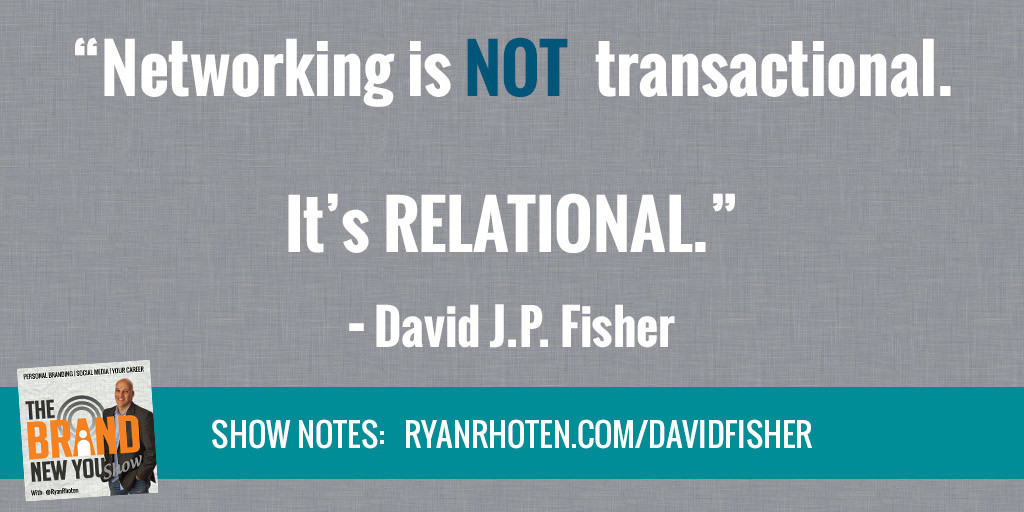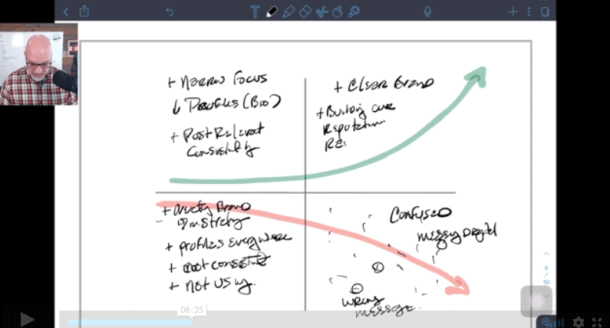
Today I welcome to the BRAND New You show David J.P. Fisher president of Rock Star Consulting.
David, AKA – MC D-Fish to his band mates, is a speaker, entrepreneur, coach, salesman, writer, marketer, yoga enthusiast and salsa dancer.
He also happens to be the author of the book Networking in the 21st century: why your network sucks and what you can do about it.
The book serves as a guide for modern professionals and walks the reader through the challenges and opportunities that exist in business networking.
David believes networking is THE difference between those who get by and those who are getting ahead!
[smart_track_player url=”http://traffic.libsyn.com/thebrandnewyoushow/David_J_P_Fisher.mp3″ title=”David J.P. Fisher – Networking in the 21st century” artist=”Ryan Rhoten” color=”f5811f” download=”false” social=”true” social_twitter=”true” social_facebook=”true” social_gplus=”true” social_linkedin=”true” social_stumble=”true” social_pinterest=”true” social_email=”true” ]
NETWORKING IN THE 21ST CENTURY BY DAVID FISHER
What is networking really? I’m finding most people I ask tend to cringe when I ask for their definition.
For some reason, networking has a negative connotation for many people. Because of this David likes to let every one define networking in a way that works for them.
He mentions however that most of us use a definition for networking that actually holds us back and keeps us from taking action. So think about that for a minute.
What’s your definition of networking? Does your definition keep you from taking action or does it align closer to Don Orlando’s definition?
David’s definition of networking is:
“Building a web of relationships with other people so that you can find mutual support and find business solutions.”
Most people think about networking in a formal perhaps creepy kind of way.
David challenges this mindset/definition by offering that each of us network every day. In fact, anytime we interact with others we are networking.
Take a minute and wrap your mind around this concept. Here’s a question to get you in the right frame of mind.
How did you find your significant other? Was it through an introduction by someone else?
Think about the most recent song you downloaded. Did you hear about it from someone else? Did you then tell others about it? That my friends is networking.
David and I discuss the common reasons people don’t like to network. Have you ever had any of these thoughts.
“I don’t have the personality for networking.”
“I’m not built for networking.”
“I don’t have time for networking.”
If you’ve ever said any of these yourself, David offers some great advice on how to get past this mindset and start developing your networking skills.
STEPS TO DEVELOP A NETWORKING PLAN
David and I spend a fair amount of time talking about how to develop a networking plan. When developing your plan, David cautions to keep it simple and do-able. So simple in fact, you can write it out on a napkin if that suits you.
Here are 3 steps to developing your networking plan.
1 – Define your professional goals
You need to identify where you want to go professionally. This may sound obvious but David gives us some real life examples of people he’s worked with over the years including CEO’s who cannot answer this question.
You need to know what you are working towards professionally or as the Cheshire Cat says:
“If you don’t know where you are going, any road will take you there.”
Don’t be the Cheshire Cat. Pick your road strategically and on purpose.
2 – Identify people to connect with
Identify 2 or 3 types of people you need to connect with in order to learn more about your chosen direction.
David gives an example of someone wanting to be an attorney and suggests in addition to identifying attorneys you want to connect with you may also want to target CPAs who work with attorneys.
3 – Know where these people hang out
This sounds simple but again David tells us how easy it is to make mistakes and go to places where your target audience is not. So if you’re selling boats you should probably head the marina if you’re selling tools go to where the mechanics hangout.
David sees too many people go to the local chamber or other networking events because they have networking in the title. He recommends thinking a couple of layers deeper and even tangentially.
NETWORKING TACTICS
I struggle with remembering people’s names when networking. David offers a few ninja tactics to help you handle remembering someone’s name.
His first and biggest suggestion is to actually pay attention to the person you are speaking with. He suggests that many of us instead of paying attention are actually thinking about what we are going to say next. GUILTY.
Also, it’s ok to tell someone you forgot their name and ask them again.
Another topic we cover is how to keep the conversation going after your initial introduction. To combat this, we discuss a tactic known as the Next Question.
The Next Question method is built on the principle established by Dale Carnegie in this famous quote:
“You can make more friends in two months by becoming interested in other people than you can in two years by trying to get other people interested in you.”
In order to make this work, you need to show interest in the other person. Your tactic should be letting the other person do most of the talking.
Ask them questions about how they got to where they are and where their journey is taking them. Keep the questions open-ended. Don’t use closed ended questions.
If it helps, think of yourself as a reporter.
DAVID FISHER WRAP
The best way to get in touch with David is via the following methods.
Twitter: @dfishrockstar
LinkedIn: linkedin.com/in/iamdfish
Web: iamdfish.com
David has four books on Networking including the newly released book we discussed during the podcast. You can pick them all up at Amazon via the affiliate links below.
Networking in the 21st century – Why your network sucks and what to do about it.
Networking in the 21st century – Within your Company.
Networking in the 21st century – On LinkedIn.
Networking in the 21st century – For millennials.
David leaves us with these final thoughts.
“Do something. You can’t think about networking and see results. You need to take that first step. Action always trumps thinking about something.”






